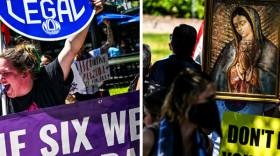Updated April 8, 2024 at 5:55 PM ET
The Vatican has released a new document calling poverty, war and the plight of migrants "threats to human dignity." But it also calls abortion, surrogacy and gender theory "grave threats" facing humanity today.
The document, titled "Infinite Dignity" says that each person's dignity comes from the love of the creator "who has imprinted the indelible features of his image on every person." This language is familiar to Christians accustomed to hearing that humans are all made in God's image.
The document goes on to say that this dignity is inalienable, beyond any circumstance or situation the person might encounter. Simply put, because a person exists, a human has intrinsic dignity.
"Infinite Dignity" details a long list of what it calls grave threats to that dignity, some of which might be expected given other Catholic teachings. It talks about the drama of poverty and how the unequal distribution of wealth denies humans their God-given dignity. It also describes war, the abuse of migrants, sexual abuse, violence against women, the marginalizing of people with disabilities, assisted suicide and abortion all as affronts to human dignity.
But then the document turns to other issues that have become more highly politicized in recent years: surrogacy, gender theory, and what it calls "sex change."
The document's framework holds that if a person is made in God's image, gender theory and gender reassignment surgery call into question why God would create a person with the wrong gender.
It says that the understanding of humanity as divided into two sexes — male and female — is biblical and deeply meaningful, especially in terms of procreation. Gender theory argues that a person's gender can be different from the sex that person was assigned at birth.
"Infinite Dignity" says the concept of human dignity can be misused to justify what it calls an "arbitrary proliferation of new rights," describing those, rather, as "individual preference" or "desire." That language is very similar to how conservatives often talk about being transgender as a choice, which is something major medical and psychological groups dispute.
The document makes a clear distinction between the issue of sexual orientation (whether a person is gay, lesbian or bisexual) and the issue of gender identity (whether a person's sex assigned at birth matches what that person understands his or her gender to be).
The document will be seen by some more conservative Catholic as a win after years of feeling embattled during Pope Francis's leadership. Just last year, the Vatican said priests could baptize transgender Catholics and allowed for priests to bless people in same-sex relationships.
But many transgender Catholics and their families as well as more progressive Catholics are displeased with "Infinite Dignity."
Executive director of the LGBTQ Catholic group New Ways Ministry, Francis DeBernardo says of the document, "When it gets to the section on people who are transgender or non-binary, it doesn't apply the principles of human dignity to them."
New Ways Ministry's mission is, in part, to help pastors and religious teachers better understand gender identity and sexuality. It also fosters, "holiness and wholeness within the Catholic LGBTQ+ community."
DeBernardo argues "Infinite Dignity" does not live up to its own name. "In a sense, it's not infinite dignity," he says. "It's a very limited dignity that the church is offering."
He fears this document will be used to further persecute transgender people, and he thinks it will cause transgender Catholics and their families to leave the church.
DeBernardo also worries the sections on gender theory and what it calls "sex change" will eclipse what he describes as the very good parts of the document on war, poverty and migrants.
The group Catholics for Choice, is also disappointed and calls into question how the document was created. "Yet again," said the group's president Jamie Manson in a written statement, "a group of all-male, celibate clergymen are telling women and gender-expansive people that their lived experiences are not real or valid."
Catholics for Choice advocates within the church on a variety of issues regarding sexual and reproductive health, including abortion rights. The group holds – and argues that Catholic teaching supports – people's individual consciences should be their guide in such decisions.
"It is clear to me that the women and trans people who continue to identify as Catholic — despite documents like this completely disregarding our experiences — only do so because of a deep love for our faith and its traditions," continues Manson in her statement. "It is devastating that our leaders do not offer the same respect and love in return."
Copyright 2024 NPR. To see more, visit https://www.npr.org.








